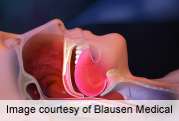For adults without diabetes, obstructive sleep apnea severity is independently associated with impaired glucose metabolism, as measured by glycated hemoglobin levels, according to a study published online June 11 in Diabetes Care.
(HealthDay) -- For adults without diabetes, obstructive sleep apnea (OSA) severity is independently associated with impaired glucose metabolism, as measured by glycated hemoglobin (HbA1c) levels, according to a study published online June 11 in Diabetes Care.
Pascaline Priou, M.D., of LUNAM University in Angers, France, and colleagues conducted a large cross-sectional study involving 1,599 patients with OSA. HbA1c levels were measured, and patients with diabetes, use of diabetes medications, or HbA1c levels ≥6.5 percent were excluded.
The researchers found that HbA1c levels increased with increasing OSA severity, as measured by the apnea-hypopnea index (AHI), with the percent of patients with HbA1c increasing from 10.8 to 34.2 percent for those with AHI values <5 to ≥50, respectively. After adjusting for potential confounding factors, the odds ratios of a patient having an HbA1c level >6.0 percent increased from 1.0 (reference) for AHI <5; to 1.40 for AHI of ≥5 to <15; to 1.8 for AHI of ≥15 to <30; to 2.02 for AHI of ≥30 to <50; to 2.96 for AHI of ≥50. Additionally, an independent association was found between increasing hypoxemia during sleep and the odds of an elevated HbA1c level.
"Among adults without known diabetes, increasing OSA severity is independently associated with impaired glucose metabolism, as assessed by higher HbA1c values, which may expose them to higher risks of diabetes and cardiovascular disease," the authors write.
More information:
Abstract
Full Text (subscription or payment may be required)
Journal information: Diabetes Care
Copyright © 2012 HealthDay. All rights reserved.




















